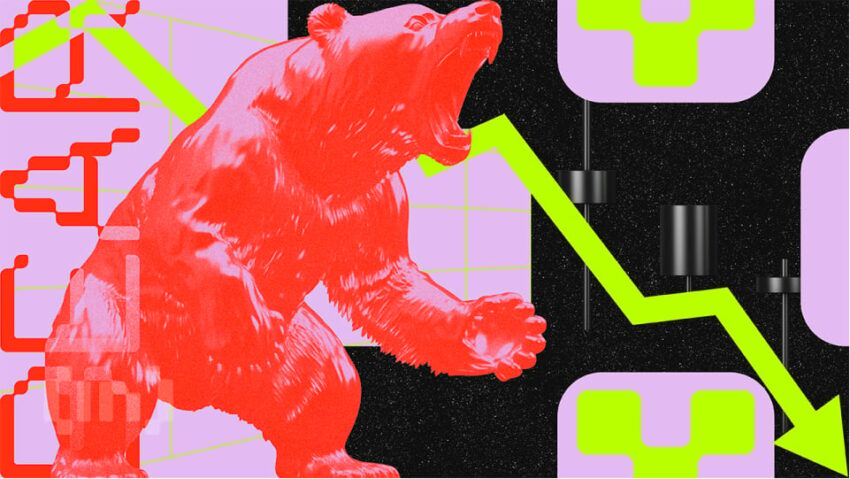Bitget:日次取引量の世界ランキングでトップ4にランクイン!
BTCマーケットシェア62.16%
Bitgetの新規上場 : Pi Network
BTC/USDT$83292.00 (-2.01%)恐怖・強欲指数25(恐怖)
アルトコインシーズン指数:0(ビットコインシーズン)
プレマーケットに上場した通貨PAWS,WCTビットコイン現物ETFの純流入総額(+$218.1M(1日)、+$111.9M(7日))。6,200 USDT相当の新規ユーザー向けウェルカムギフトパッケージ。今すぐ獲得する
Bitgetアプリでいつでもどこでも取引しましょう今すぐダウンロードする
Bitget:日次取引量の世界ランキングでトップ4にランクイン!
BTCマーケットシェア62.16%
Bitgetの新規上場 : Pi Network
BTC/USDT$83292.00 (-2.01%)恐怖・強欲指数25(恐怖)
アルトコインシーズン指数:0(ビットコインシーズン)
プレマーケットに上場した通貨PAWS,WCTビットコイン現物ETFの純流入総額(+$218.1M(1日)、+$111.9M(7日))。6,200 USDT相当の新規ユーザー向けウェルカムギフトパッケージ。今すぐ獲得する
Bitgetアプリでいつでもどこでも取引しましょう今すぐダウンロードする
Bitget:日次取引量の世界ランキングでトップ4にランクイン!
BTCマーケットシェア62.16%
Bitgetの新規上場 : Pi Network
BTC/USDT$83292.00 (-2.01%)恐怖・強欲指数25(恐怖)
アルトコインシーズン指数:0(ビットコインシーズン)
プレマーケットに上場した通貨PAWS,WCTビットコイン現物ETFの純流入総額(+$218.1M(1日)、+$111.9M(7日))。6,200 USDT相当の新規ユーザー向けウェルカムギフトパッケージ。今すぐ獲得する
Bitgetアプリでいつでもどこでも取引しましょう今すぐダウンロードする


CruxDecussataの価格X
未上場
決済通貨:
JPY
データはサードパーティプロバイダーから入手したものです。このページと提供される情報は、特定の暗号資産を推奨するものではありません。上場されている通貨の取引をご希望ですか? こちらをクリック
¥3.83+1.01%1D
価格チャート
最終更新:2025-04-03 10:36:17(UTC+0)
時価総額:--
完全希薄化の時価総額:--
24時間取引量:--
24時間取引量 / 時価総額:0.00%
24時間高値:¥3.96
24時間安値:¥3.78
過去最高値:¥26.63
過去最安値:¥0.1100
循環供給量:-- X
総供給量:
100,000,000X
流通率:0.00%
最大供給量:
100,000,000X
BTCでの価格:0.{6}3142 BTC
ETHでの価格:0.{4}1453 ETH
BTC時価総額での価格:
--
ETH時価総額での価格:
--
コントラクト:
0xaBeC...807237c(Ethereum)
CruxDecussataに投票しましょう!
注:この情報はあくまでも参考情報です。
今日のCruxDecussataの価格
CruxDecussata の今日の現在価格は、(X / JPY)あたり¥3.83 で、現在の時価総額は¥0.00 JPYです。24時間の取引量は¥0.00 JPYです。XからJPYの価格はリアルタイムで更新されています。CruxDecussata は1.01%過去24時間で変動しました。循環供給は0 です。
Xの最高価格はいくらですか?
Xの過去最高値(ATH)は2023-08-04に記録された¥26.63です。
Xの最安価格はいくらですか?
Xの過去最安値(ATL)は2023-08-01に記録され¥0.1100です。
CruxDecussataの価格予測
Xの買い時はいつですか? 今は買うべきですか?それとも売るべきですか?
Xを買うか売るかを決めるときは、まず自分の取引戦略を考える必要があります。長期トレーダーと短期トレーダーの取引活動も異なります。BitgetXテクニカル分析は取引の参考になります。
X4時間ごとのテクニカル分析によると取引シグナルは売れ行き好調です。
X1日ごとのテクニカル分析によると取引シグナルは売却です。
X1週間ごとのテクニカル分析によると取引シグナルは売れ行き好調です。
2026年のXの価格はどうなる?
Xの過去の価格パフォーマンス予測モデルによると、Xの価格は2026年に¥3.94に達すると予測されます。
2031年のXの価格はどうなる?
2031年には、Xの価格は+28.00%変動する見込みです。 2031年末には、Xの価格は¥6.41に達し、累積ROIは+69.51%になると予測されます。
CruxDecussataの価格履歴(JPY)
CruxDecussataの価格は、この1年で-38.39%を記録しました。直近1年間のJPY建ての最高値は¥11.41で、直近1年間のJPY建ての最安値は¥3.04でした。
時間価格変動率(%) 最低価格
最低価格 最高価格
最高価格 
 最低価格
最低価格 最高価格
最高価格 
24h+1.01%¥3.78¥3.96
7d-14.98%¥3.66¥4.42
30d+4.75%¥3.04¥4.56
90d-60.88%¥3.04¥11.04
1y-38.39%¥3.04¥11.41
すべての期間-50.48%¥0.1100(2023-08-01, 1年前 )¥26.63(2023-08-04, 1年前 )
CruxDecussataの市場情報
CruxDecussataの集中度別保有量
大口
投資家
リテール
CruxDecussataの保有時間別アドレス
長期保有者
クルーザー
トレーダー
coinInfo.name(12)のリアル価格チャート

CruxDecussataの評価
コミュニティからの平均評価
4.6
このコンテンツは情報提供のみを目的としたものです。
Xから現地通貨
1 X から MXN$0.531 X から GTQQ0.21 X から CLP$25.021 X から HNLL0.671 X から UGXSh95.461 X から ZARR0.491 X から TNDد.ت0.081 X から IQDع.د34.291 X から TWDNT$0.871 X から RSDдин.2.791 X から DOP$1.651 X から MYRRM0.121 X から GEL₾0.071 X から UYU$1.11 X から MADد.م.0.251 X から OMRر.ع.0.011 X から AZN₼0.041 X から KESSh3.381 X から SEKkr0.261 X から UAH₴1.08
- 1
- 2
- 3
- 4
- 5
最終更新:2025-04-03 10:36:17(UTC+0)
CruxDecussataのニュース

予測市場データによれば、米国経済が今年景気後退に陥る確率は50%を超えている。
cointime-jp-flash•2025-04-03 01:36

ジャスティン・サン:FDTは破産に陥り詐欺の疑いがあり、香港の規制当局に断固たる措置を取るよう求める
cointime-jp-flash•2025-04-03 01:18

何毅氏:バイナンスは、この法的紛争について知らずに発表を行うのは不適切だ
cointime-jp-flash•2025-04-02 18:12

ホワイトハウス報道官:マスク氏はDOGEの仕事を完了した後、公職に就くことはない
cointime-jp-flash•2025-04-02 17:42

ビットコイン、円キャリートレードの影響で脆弱になる理由
Beincrypto•2025-04-02 16:12
もっと購入する
よくあるご質問
CruxDecussataの現在の価格はいくらですか?
CruxDecussataのライブ価格は¥3.83(X/JPY)で、現在の時価総額は¥0 JPYです。CruxDecussataの価値は、暗号資産市場の24時間365日休みない動きにより、頻繁に変動します。CruxDecussataのリアルタイムでの現在価格とその履歴データは、Bitgetで閲覧可能です。
CruxDecussataの24時間取引量は?
過去24時間で、CruxDecussataの取引量は¥0.00です。
CruxDecussataの過去最高値はいくらですか?
CruxDecussata の過去最高値は¥26.63です。この過去最高値は、CruxDecussataがローンチされて以来の最高値です。
BitgetでCruxDecussataを購入できますか?
はい、CruxDecussataは現在、Bitgetの取引所で利用できます。より詳細な手順については、お役立ちの購入方法 ガイドをご覧ください。
CruxDecussataに投資して安定した収入を得ることはできますか?
もちろん、Bitgetは戦略的取引プラットフォームを提供し、インテリジェントな取引Botで取引を自動化し、利益を得ることができます。
CruxDecussataを最も安く購入できるのはどこですか?
戦略的取引プラットフォームがBitget取引所でご利用いただけるようになりました。Bitgetは、トレーダーが確実に利益を得られるよう、業界トップクラスの取引手数料と流動性を提供しています。
暗号資産はどこで購入できますか?
動画セクション - 素早く認証を終えて、素早く取引へ

Bitgetで本人確認(KYC認証)を完了し、詐欺から身を守る方法
1. Bitgetアカウントにログインします。
2. Bitgetにまだアカウントをお持ちでない方は、アカウント作成方法のチュートリアルをご覧ください。
3. プロフィールアイコンにカーソルを合わせ、「未認証」をクリックし、「認証する」をクリックしてください。
4. 発行国または地域と身分証の種類を選択し、指示に従ってください。
5. 「モバイル認証」または「PC」をご希望に応じて選択してください。
6. 個人情報を入力し、身分証明書のコピーを提出し、自撮りで撮影してください。
7. 申請書を提出すれば、本人確認(KYC認証)は完了です。
Bitgetを介してオンラインでCruxDecussataを購入することを含む暗号資産投資は、市場リスクを伴います。Bitgetでは、簡単で便利な購入方法を提供しており、取引所で提供している各暗号資産について、ユーザーに十分な情報を提供するよう努力しています。ただし、CruxDecussataの購入によって生じる結果については、当社は責任を負いかねます。このページおよび含まれる情報は、特定の暗号資産を推奨するものではありません。
Bitgetインサイト

BGUSER-02MVTCWG
48分
Trade
Comprehensive Guide to Crypto Trading: Spot, Futures, Options, and Copy Trading
Table of Contents
* Introduction to Crypto Trading
* Spot Trading
* 2.1 Definition and Mechanics
* 2.2 Pros and Cons
* 2.3 Strategies and Tools
* 2.4 Advanced Spot Trading Techniques
* Futures Trading
* 3.1 Definition and Mechanics
* 3.2 Types of Futures Contracts
* 3.3 Pros and Cons
* 3.4 Risk Management
* 3.5 Advanced Futures Strategies
* Options Trading
* 4.1 Definition and Mechanics
* 4.2 Types of Options
* 4.3 Pros and Cons
* 4.4 Advanced Strategies
* 4.5 Options Greeks and Volatility Analysis
* Copy Trading
* 5.1 Definition and Mechanics
* 5.2 Platforms and Tools
* 5.3 Pros and Cons
* 5.4 Selecting Successful Traders
* Candlestick Patterns and Profitability Analysis
* 6.1 Introduction to Candlestick Charts
* 6.2 Bullish Candlestick Patterns
* 6.2.1 Hammer
* 6.2.2 Inverted Hammer
* 6.2.3 Bullish Engulfing
* 6.2.4 Piercing Line
* 6.2.5 Three White Soldiers
* 6.2.6 Morning Star
* 6.3 Bearish Candlestick Patterns
* 6.3.1 Hanging Man
* 6.3.2 Shooting Star
* 6.3.3 Bearish Engulfing
* 6.3.4 Evening Star
* 6.3.5 Three Black Crows
* 6.3.6 Dark Cloud Cover
* 6.4 Indecision Patterns
* 6.4.1 Doji
* 6.4.2 Spinning Top
* 6.5 Combining Candlestick Patterns with Technical Indicators
* 6.6 Profitability Analysis: Key Metrics and Techniques
* Comparative Analysis
* Risk Management Across All Strategies
* 8.1 Diversification
* 8.2 Position Sizing
* 8.3 Stop-Loss and Take-Profit Orders
* 8.4 Emotional Control
* 8.5 Continuous Learning
* Conclusion
* Glossary of Crypto Trading Terms
* References & Further Reading
1. Introduction to Crypto Trading
Cryptocurrency trading has revolutionized financial markets, offering 24/7 access to a highly volatile yet potentially lucrative asset class. Unlike traditional markets, crypto trading operates continuously, presenting both opportunities and challenges. Understanding the nuances of various trading strategies—spot, futures, options, and copy trading—is crucial for navigating this dynamic environment.
2. Spot Trading
* 2.1 Definition and Mechanics:
* Spot trading involves the immediate purchase or sale of cryptocurrencies at the current market price. This straightforward approach provides direct ownership of assets.
* Order Types:
* Market Orders: Executed instantly at the best available price.
* Limit Orders: Executed only at a specified price or better.
* Stop Orders: Executed once a certain price is reached.
* Liquidity: Essential for minimizing slippage and ensuring smooth transactions.
* 2.2 Pros and Cons:
* Pros:
* Real-time pricing.
* Direct asset ownership.
* Simplicity and ease of use.
* Cons:
* Exposure to high volatility.
* Limited leverage.
* Limited shorting ability.
* 2.3 Strategies and Tools:
* Day Trading: Capitalizing on short-term price fluctuations within a single trading day.
* Scalping: Profiting from small, frequent price movements.
* Swing Trading: Holding positions for several days or weeks to capture larger price swings.
* Tools:
* Candlestick charts.
* Technical indicators (RSI, MACD, Bollinger Bands).
* TradingView and other charting platforms.
* 2.4 Advanced Spot Trading Techniques:
* Dollar-Cost Averaging (DCA): Regularly buying a fixed amount of crypto to mitigate volatility.
* Breakout Trading: Identifying and capitalizing on significant price movements.
* Support and Resistance Trading: Using key price levels to identify potential entry and exit points.
3. Futures Trading
* 3.1 Definition and Mechanics:
* Futures contracts are agreements to buy or sell an asset at a predetermined price and date.
* Margin Trading: Allows traders to control larger positions with less capital.
* Perpetual Futures: Contracts without expiry dates.
* Fixed-Date Futures: Contracts with specific settlement dates.
* 3.2 Types of Futures Contracts:
* Perpetual futures.
* Quarterly futures.
* Weekly futures.
* 3.3 Pros and Cons:
* Pros:
* High leverage (up to 125x).
* Ability to profit from both rising and falling markets.
* Hedging capabilities.
* Cons:
* High liquidation risks.
* Increased complexity.
* Higher fees.
* 3.4 Risk Management:
* Stop-Loss Orders: Limiting potential losses.
* Take-Profit Orders: Securing profits at predetermined levels.
* Position Sizing: Managing the amount of capital at risk.
* Margin Requirements: Maintaining sufficient collateral.
* 3.5 Advanced Futures Strategies:
* Arbitrage: Exploiting price differences between exchanges.
* Hedging: Using futures to offset potential losses in spot holdings.
* Trend Following: Identifying and trading in the direction of prevailing trends.
4. Options Trading
* 4.1 Definition and Mechanics:
* Options contracts give the right, but not the obligation, to buy or sell an asset at a specific price (strike price) by a certain date (expiry).
* Call Options: Right to buy.
* Put Options: Right to sell.
* 4.2 Types of Options:
* American Options: Exercisable at any time before expiry.
* European Options: Exercisable only on the expiry date.
* 4.3 Pros and Cons:
* Pros:
* Flexibility in trading strategies.
* Hedging capabilities.
* Limited downside risk (for buyers).
* Cons:
* High premiums.
* Complex strategies.
* Low liquidity for some altcoin options.
* 4.4 Advanced Strategies:
* Straddles: Profit from significant price movements in either direction.
* Strangles: Similar to straddles but with wider strike prices.
* Credit Spreads: Profit from time decay and limited price movements.
* Debit Spreads: Profit from price movements in a specific direction.
* 4.5 Options Greeks and Volatility Analysis:
* Greeks: Delta, Gamma, Theta, Vega, Rho.
* Understanding Implied Volatility (IV).
5. Copy Trading
* 5.1 Definition and Mechanics:
* Automatically replicating the trades of experienced traders.
* Platforms: eToro, Binance Copy Trading, ZuluTrade.
* Risk Allocation: Setting the percentage of capital to allocate.
* 5.2 Pros and Cons:
* Pros:
* Learning from experienced traders.
* Potential for passive income.
* Diversification.
* Cons:
* Dependency on others.
* Platform fees.
* Limited control.
* 5.3 Selecting Successful Traders:
* Analyzing past performance.
* Evaluating risk management strategies.
* Considering consistency and transparency.
6. Candlestick Patterns and Profitability Analysis
* 6.1 Introduction to Candlestick Charts:
* Candlesticks represent price movements over a specific period.
* Components: Open, High, Low, Close.
* Visual representation of market sentiment.
* 6.2 Bullish Candlestick Patterns:
* 6.2.1 Hammer:
* A small body with a long lower shadow.
* Indicates potential bullish reversal.
* [attachment_0](attachment)
* 6.2.2 Inverted Hammer:
* A small body with a long upper shadow.
* Indicates potential bullish reversal after a downtrend.
* [attachment_1](attachment)
* 6.2.3 Bullish Engulfing:
* A large bullish candle that engulfs the previous bearish candle.
* Strong bullish reversal signal.
* [attachment_2](attachment)
* 6.2.4 Piercing Line:
* A bearish candle followed by a bullish candle that closes above the midpoint of the bearish candle.
* Indicates potential bullish reversal.
* [attachment_3](attachment)
* 6.2.5 Three White Soldiers:
* Three consecutive bullish candles with small shadows.
* Strong bullish trend signal.
* [attachment_4](attachment)
* 6.2.6 Morning Star:
* A three-candle pattern indicating a bullish reversal.
* [attachment_5](attachment)
* 6.3 Bearish Candlestick Patterns:
* 6.3.1 Hanging Man:
* A small body with a long lower shadow after an uptrend.
* Indicates potential bearish reversal.
* [attachment_6](attachment)
* 6.3.2 Shooting Star:
* A small body with a long upper shadow after an uptrend.
* Indicates potential bearish reversal.
* [attachment_7](attachment)
* 6.3.3 Bearish Engulfing:
* A large bearish candle that engulfs the previous bullish candle.
* Strong bearish reversal signal.
* [attachment_8](attachment)
* 6.3.4 Evening Star:
* A three-candle pattern indicating a bearish reversal.
* [attachment_9](attachment)
* 6.3.5 Three Black Crows:
* Three consecutive bearish candles with small shadows.
* Strong bearish trend signal.
* [attachment_10](attachment)
* 6.3.6 Dark Cloud Cover:
* A bullish candle followed by a bearish candle that closes below the midpoint of the bullish candle.
* Indicates potential bearish reversal.
* [attachment_11](attachment)
* 6.4 Indecision Patterns:
* 6.4.1 Doji:
* Open and close prices are nearly equal.
* Indicates market indecision.
* [attachment_12](attachment)
* 6.4.2 Spinning Top:
* Small body with upper and lower shadows.
* Indicates market indecision.
* [attachment_13](attachment)
* 6.5 Combining Candlestick Patterns with Technical Indicators:
* RSI (Relative Strength Index).
* MACD (Moving Average Convergence Divergence).
* Bollinger Bands.
* Volume analysis.
* 6.6 Profitability Analysis: Key Metrics and Techniques:
* Risk-Reward Ratio.
* Win Rate.
* Profit Factor.
* Sharpe Ratio.
* Sortino Ratio.
7. Comparative Analysis
| Aspect | Spot | Futures | Options | Copy Trading |
|---|---|---|---|---|
| Complexity | Low | High | High | Low |
| Leverage | None | Up to 125x | Limited | None |
| Risk | Moderate | High | Moderate | Low |
| Profit Potential | Linear | Exponential | Variable | Variable |
8. Risk Management Across All Strategies
* 8.1 Diversification:
* Spreading investments across multiple assets.
* 8.2 Position Sizing:
* Calculating the appropriate amount of capital to risk per trade.
* 8.3 Stop-Loss and Take-Profit Orders:
* Automating exits to limit losses and secure profits.
* 8.4 Emotional Control:
* Avoiding impulsive decisions driven by fear or greed.
* 8.5 Continuous Learning:
* Staying updated on market trends and strategies.
9. Conclusion
Crypto trading offers a wide range of opportunities, but success requires a thorough understanding of each strategy, effective risk management, and continuous learning.
10. Glossary of Crypto Trading Terms
* Altcoin: Any cryptocurrency other than Bitcoin.
* Arbitrage: Taking advantage of price differences between exchanges.
* Ask Price: The lowest price a seller is willing to accept.
* Bid Price: The highest price a buyer is willing to pay.
* Bullish: Indicating an upward price trend.
* Bearish: Indicating a downward price trend.
* Doji: A candlestick with equal open and close prices.
* Futures: Contracts to buy or sell an asset at a predetermined price and date.
* Hedge: Using a trading strategy to offset potential losses.
* Leverage: Using borrowed capital to increase potential returns (and risks).
* Liquidation: Forced closure of a leveraged position due to insufficient margin.
* Margin: Collateral required to open a leveraged trade.
* Options: Contracts that give the right, but not the obligation, to buy or sell an asset.
* RSI (Relative Strength Index): A momentum indicator.
* Stop-Loss Order: An order to automatically close a position at a specified price.
* Take-Profit Order: An order to automatically close a position at a specified profit level.
* Volatility: The degree of price fluctuations.
11. References & Further Reading
* Investopedia: Cryptocurrency Trading
* Binance Academy: Crypto Trading Guides
* TradingView: Charting and Analysis
* CryptoQuant: On-Chain Data Analysis
This comprehensive guide provides a solid foundation for understanding and navigating the complexities of cryptocurrency trading. Remember to always conduct thorough research and practice risk management to maximize your potential for success.
CLOUD+0.23%
X+1.91%

mnbrz-co
59分
$THE
Margin : 100-300$
Leverage : 5-25X
Type : Cross
Future Wallet: 1500$
Entry Price : 0.22 - 0.27
TP1: 0.28
TP2: 0.29
TP3: 0.3
TP4: 0.31
STOP LOSS 🛑 : 0.18
Holding Time: NA
X+1.91%

CryptoNews
1時
Tariff fears spark $161M sell-off in spot BTC & ETH ETFs – What’s next for crypto?
Tariff fears tri
Tariff fears spark $161M sell-off in spot BTC & ETH ETFs – What’s next for crypto?
Tariff fears triggered a potential sell-off of $161 million in spot BTC and ETH ETFs.
The tariff tension is already impacting the cryptocurrency market, with assets experiencing a massive price decline as investors take strategic action ahead of today’s announcement.
Since Donald Trump’s presidential inauguration in the United States, the overall cryptocurrency market has fallen significantly and is set for further decline as his tariffs show no signs of ending soon.
On the 2nd of April, a crypto analyst shared a post on X (formerly Twitter) stating that spot Bitcoin ETFs saw a $157.8 million outflow, while spot Ethereum ETFs saw a $3.6 million outflow on the 1st of April.
This indicates that investors are withdrawing their money from these assets. Large outflows are often seen as a bearish sign, as they can .
BTC+0.96%
X+1.91%

BGUSER-02MVTCWG
1時
Trade
Comprehensive Guide to Crypto Trading: Spot, Futures, Options, and Copy Trading
Table of Contents
* Introduction to Crypto Trading
* Spot Trading
* 2.1 Definition and Mechanics
* 2.2 Pros and Cons
* 2.3 Strategies and Tools
* 2.4 Advanced Spot Trading Techniques
* Futures Trading
* 3.1 Definition and Mechanics
* 3.2 Types of Futures Contracts
* 3.3 Pros and Cons
* 3.4 Risk Management
* 3.5 Advanced Futures Strategies
* Options Trading
* 4.1 Definition and Mechanics
* 4.2 Types of Options
* 4.3 Pros and Cons
* 4.4 Advanced Strategies
* 4.5 Options Greeks and Volatility Analysis
* Copy Trading
* 5.1 Definition and Mechanics
* 5.2 Platforms and Tools
* 5.3 Pros and Cons
* 5.4 Selecting Successful Traders
* Candlestick Patterns and Profitability Analysis
* 6.1 Introduction to Candlestick Charts
* 6.2 Bullish Candlestick Patterns
* 6.2.1 Hammer
* 6.2.2 Inverted Hammer
* 6.2.3 Bullish Engulfing
* 6.2.4 Piercing Line
* 6.2.5 Three White Soldiers
* 6.2.6 Morning Star
* 6.3 Bearish Candlestick Patterns
* 6.3.1 Hanging Man
* 6.3.2 Shooting Star
* 6.3.3 Bearish Engulfing
* 6.3.4 Evening Star
* 6.3.5 Three Black Crows
* 6.3.6 Dark Cloud Cover
* 6.4 Indecision Patterns
* 6.4.1 Doji
* 6.4.2 Spinning Top
* 6.5 Combining Candlestick Patterns with Technical Indicators
* 6.6 Profitability Analysis: Key Metrics and Techniques
* Comparative Analysis
* Risk Management Across All Strategies
* 8.1 Diversification
* 8.2 Position Sizing
* 8.3 Stop-Loss and Take-Profit Orders
* 8.4 Emotional Control
* 8.5 Continuous Learning
* Conclusion
* Glossary of Crypto Trading Terms
* References & Further Reading
1. Introduction to Crypto Trading
Cryptocurrency trading has revolutionized financial markets, offering 24/7 access to a highly volatile yet potentially lucrative asset class. Unlike traditional markets, crypto trading operates continuously, presenting both opportunities and challenges. Understanding the nuances of various trading strategies—spot, futures, options, and copy trading—is crucial for navigating this dynamic environment.
2. Spot Trading
* 2.1 Definition and Mechanics:
* Spot trading involves the immediate purchase or sale of cryptocurrencies at the current market price. This straightforward approach provides direct ownership of assets.
* Order Types:
* Market Orders: Executed instantly at the best available price.
* Limit Orders: Executed only at a specified price or better.
* Stop Orders: Executed once a certain price is reached.
* Liquidity: Essential for minimizing slippage and ensuring smooth transactions.
* 2.2 Pros and Cons:
* Pros:
* Real-time pricing.
* Direct asset ownership.
* Simplicity and ease of use.
* Cons:
* Exposure to high volatility.
* Limited leverage.
* Limited shorting ability.
* 2.3 Strategies and Tools:
* Day Trading: Capitalizing on short-term price fluctuations within a single trading day.
* Scalping: Profiting from small, frequent price movements.
* Swing Trading: Holding positions for several days or weeks to capture larger price swings.
* Tools:
* Candlestick charts.
* Technical indicators (RSI, MACD, Bollinger Bands).
* TradingView and other charting platforms.
* 2.4 Advanced Spot Trading Techniques:
* Dollar-Cost Averaging (DCA): Regularly buying a fixed amount of crypto to mitigate volatility.
* Breakout Trading: Identifying and capitalizing on significant price movements.
* Support and Resistance Trading: Using key price levels to identify potential entry and exit points.
3. Futures Trading
* 3.1 Definition and Mechanics:
* Futures contracts are agreements to buy or sell an asset at a predetermined price and date.
* Margin Trading: Allows traders to control larger positions with less capital.
* Perpetual Futures: Contracts without expiry dates.
* Fixed-Date Futures: Contracts with specific settlement dates.
* 3.2 Types of Futures Contracts:
* Perpetual futures.
* Quarterly futures.
* Weekly futures.
* 3.3 Pros and Cons:
* Pros:
* High leverage (up to 125x).
* Ability to profit from both rising and falling markets.
* Hedging capabilities.
* Cons:
* High liquidation risks.
* Increased complexity.
* Higher fees.
* 3.4 Risk Management:
* Stop-Loss Orders: Limiting potential losses.
* Take-Profit Orders: Securing profits at predetermined levels.
* Position Sizing: Managing the amount of capital at risk.
* Margin Requirements: Maintaining sufficient collateral.
* 3.5 Advanced Futures Strategies:
* Arbitrage: Exploiting price differences between exchanges.
* Hedging: Using futures to offset potential losses in spot holdings.
* Trend Following: Identifying and trading in the direction of prevailing trends.
4. Options Trading
* 4.1 Definition and Mechanics:
* Options contracts give the right, but not the obligation, to buy or sell an asset at a specific price (strike price) by a certain date (expiry).
* Call Options: Right to buy.
* Put Options: Right to sell.
* 4.2 Types of Options:
* American Options: Exercisable at any time before expiry.
* European Options: Exercisable only on the expiry date.
* 4.3 Pros and Cons:
* Pros:
* Flexibility in trading strategies.
* Hedging capabilities.
* Limited downside risk (for buyers).
* Cons:
* High premiums.
* Complex strategies.
* Low liquidity for some altcoin options.
* 4.4 Advanced Strategies:
* Straddles: Profit from significant price movements in either direction.
* Strangles: Similar to straddles but with wider strike prices.
* Credit Spreads: Profit from time decay and limited price movements.
* Debit Spreads: Profit from price movements in a specific direction.
* 4.5 Options Greeks and Volatility Analysis:
* Greeks: Delta, Gamma, Theta, Vega, Rho.
* Understanding Implied Volatility (IV).
5. Copy Trading
* 5.1 Definition and Mechanics:
* Automatically replicating the trades of experienced traders.
* Platforms: eToro, Binance Copy Trading, ZuluTrade.
* Risk Allocation: Setting the percentage of capital to allocate.
* 5.2 Pros and Cons:
* Pros:
* Learning from experienced traders.
* Potential for passive income.
* Diversification.
* Cons:
* Dependency on others.
* Platform fees.
* Limited control.
* 5.3 Selecting Successful Traders:
* Analyzing past performance.
* Evaluating risk management strategies.
* Considering consistency and transparency.
6. Candlestick Patterns and Profitability Analysis
* 6.1 Introduction to Candlestick Charts:
* Candlesticks represent price movements over a specific period.
* Components: Open, High, Low, Close.
* Visual representation of market sentiment.
* 6.2 Bullish Candlestick Patterns:
* 6.2.1 Hammer:
* A small body with a long lower shadow.
* Indicates potential bullish reversal.
* [attachment_0](attachment)
* 6.2.2 Inverted Hammer:
* A small body with a long upper shadow.
* Indicates potential bullish reversal after a downtrend.
* [attachment_1](attachment)
* 6.2.3 Bullish Engulfing:
* A large bullish candle that engulfs the previous bearish candle.
* Strong bullish reversal signal.
* [attachment_2](attachment)
* 6.2.4 Piercing Line:
* A bearish candle followed by a bullish candle that closes above the midpoint of the bearish candle.
* Indicates potential bullish reversal.
* [attachment_3](attachment)
* 6.2.5 Three White Soldiers:
* Three consecutive bullish candles with small shadows.
* Strong bullish trend signal.
* [attachment_4](attachment)
* 6.2.6 Morning Star:
* A three-candle pattern indicating a bullish reversal.
* [attachment_5](attachment)
* 6.3 Bearish Candlestick Patterns:
* 6.3.1 Hanging Man:
* A small body with a long lower shadow after an uptrend.
* Indicates potential bearish reversal.
* [attachment_6](attachment)
* 6.3.2 Shooting Star:
* A small body with a long upper shadow after an uptrend.
* Indicates potential bearish reversal.
* [attachment_7](attachment)
* 6.3.3 Bearish Engulfing:
* A large bearish candle that engulfs the previous bullish candle.
* Strong bearish reversal signal.
* [attachment_8](attachment)
* 6.3.4 Evening Star:
* A three-candle pattern indicating a bearish reversal.
* [attachment_9](attachment)
* 6.3.5 Three Black Crows:
* Three consecutive bearish candles with small shadows.
* Strong bearish trend signal.
* [attachment_10](attachment)
* 6.3.6 Dark Cloud Cover:
* A bullish candle followed by a bearish candle that closes below the midpoint of the bullish candle.
* Indicates potential bearish reversal.
* [attachment_11](attachment)
* 6.4 Indecision Patterns:
* 6.4.1 Doji:
* Open and close prices are nearly equal.
* Indicates market indecision.
* [attachment_12](attachment)
* 6.4.2 Spinning Top:
* Small body with upper and lower shadows.
* Indicates market indecision.
* [attachment_13](attachment)
* 6.5 Combining Candlestick Patterns with Technical Indicators:
* RSI (Relative Strength Index).
* MACD (Moving Average Convergence Divergence).
* Bollinger Bands.
* Volume analysis.
* 6.6 Profitability Analysis: Key Metrics and Techniques:
* Risk-Reward Ratio.
* Win Rate.
* Profit Factor.
* Sharpe Ratio.
* Sortino Ratio.
7. Comparative Analysis
| Aspect | Spot | Futures | Options | Copy Trading |
|---|---|---|---|---|
| Complexity | Low | High | High | Low |
| Leverage | None | Up to 125x | Limited | None |
| Risk | Moderate | High | Moderate | Low |
| Profit Potential | Linear | Exponential | Variable | Variable |
8. Risk Management Across All Strategies
* 8.1 Diversification:
* Spreading investments across multiple assets.
* 8.2 Position Sizing:
* Calculating the appropriate amount of capital to risk per trade.
* 8.3 Stop-Loss and Take-Profit Orders:
* Automating exits to limit losses and secure profits.
* 8.4 Emotional Control:
* Avoiding impulsive decisions driven by fear or greed.
* 8.5 Continuous Learning:
* Staying updated on market trends and strategies.
9. Conclusion
Crypto trading offers a wide range of opportunities, but success requires a thorough understanding of each strategy, effective risk management, and continuous learning.
10. Glossary of Crypto Trading Terms
* Altcoin: Any cryptocurrency other than Bitcoin.
* Arbitrage: Taking advantage of price differences between exchanges.
* Ask Price: The lowest price a seller is willing to accept.
* Bid Price: The highest price a buyer is willing to pay.
* Bullish: Indicating an upward price trend.
* Bearish: Indicating a downward price trend.
* Doji: A candlestick with equal open and close prices.
* Futures: Contracts to buy or sell an asset at a predetermined price and date.
* Hedge: Using a trading strategy to offset potential losses.
* Leverage: Using borrowed capital to increase potential returns (and risks).
* Liquidation: Forced closure of a leveraged position due to insufficient margin.
* Margin: Collateral required to open a leveraged trade.
* Options: Contracts that give the right, but not the obligation, to buy or sell an asset.
* RSI (Relative Strength Index): A momentum indicator.
* Stop-Loss Order: An order to automatically close a position at a specified price.
* Take-Profit Order: An order to automatically close a position at a specified profit level.
* Volatility: The degree of price fluctuations.
11. References & Further Reading
* Investopedia: Cryptocurrency Trading
* Binance Academy: Crypto Trading Guides
* TradingView: Charting and Analysis
* CryptoQuant: On-Chain Data Analysis
This comprehensive guide provides a solid foundation for understanding and navigating the complexities of cryptocurrency trading. Remember to always conduct thorough research and practice risk management to maximize your potential for success.
CLOUD+0.23%
X+1.91%

Hyper_Crypto
1時
--------Coin Name: FARTCOIN (Signal)------------
#FARTCOIN /USDT
Signal Type: (SHORT)
Leverage : (5X)
Entry: 0.3870 0.4150
Total margin use 4%
🎯 TARGET 1: 0.3500
🎯 TARGET 2: 0.3200
🎯 TARGET 3: 0.2600
Stop Loss:
) 0.4900
HIGH RISKY TRADE USE 5%-10% FUND
X+1.91%
FARTCOIN-8.38%
関連資産
最近追加された暗号資産
最も最近追加された暗号資産
同等の時価総額
すべてのBitget資産の中で、時価総額がCruxDecussataに最も近いのはこれらの8資産です。

































